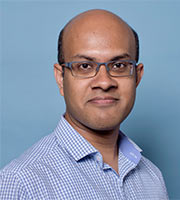IEEE SPS SAM TC Webinar: 24 February 2022, by Dr. Sundeep Prabhakar Chepuri

IEEE SPS SAM TC Webinar
(Organized by the IEEE SPS Sensor Array and Multichannel Technical Committee (SAM TC))
Title: Massive MIMO Systems with One-bit Spatial Sigma-Delta ADCs
Date: 24 February 2022
Time: 10:00 AM - 11:00 AM EST (New York time)
Duration: Approximately 1 Hour
Presenters: Dr. Sundeep Prabhakar Chepuri
Register for the webinar to acquire Zoom link!
About the topic:
Millimeter wave (mmWave) multiple-input multiple-output (MIMO) systems have become very popular for sensing and wireless communications beyond 5G. While the abundant spectrum available at the mmWave frequency bands enables higher cellular data rates and precise positioning, links at mmWave frequencies are very sensitive to blockages and have significantly higher path loss. These issues are alleviated by beamforming with very large antenna arrays, typically packed in small areas. High-resolution analog-to-digital converters and digital-to-analog converters for every antenna in the array significantly increase the radio frequency complexity and power consumption of massive MIMO systems. Low-resolution quantizers (e.g., 1-bit) are thus preferred albeit their deteriorated performance. Sigma-delta quantization is a classical technique used to increase the effective resolution of low-resolution quantizers.
In this talk, we will discuss an extension of sigma-delta quantization to the spatial domain, referred to as spatial sigma-delta quantization. The quantization noise at lower spatial frequencies in a low-resolution spatial sigma-delta quantizer is significantly reduced as if it was arising from a higher-resolution quantizer. We then present the quantization noise model, beamforming and direction finding methods useful for source localization with large arrays and mmWave channel estimation with angular models.
About the presenter:

Sundeep Prabhakar Chepuri received his M.Sc. degree (cum laude) in electrical engineering and Ph.D. degree (cum laude) from the Delft University of Technology, The Netherlands, in July 2011 and January 2016, respectively. He was a Postdoctoral researcher at the Delft University of Technology, The Netherlands, a visiting researcher at University of Minnesota, USA, and a visiting lecturer at Aalto University, Finland. He has held positions at Robert Bosch, India, during 2007- 2009, and Holst Centre/imec-nl, The Netherlands, during 2010-2011. Currently, he is an Assistant Professor at the Department of ECE at the Indian Institute of Science (IISc) in Bengaluru, India.
Dr. Chepuri was a recipient of the Best Student Paper Award at the IEEE International Conference on Acoustics, Speech and Signal Processing (ICASSP) in 2015, Best Student Paper Award (as co-author) at ASILOMAR 2019, and the Pratiksha Trust Young Investigator award. He was an Associate Editor of the EURASIP Journal on Advances in Signal Processing. Currently, he is an elected member of the EURASIP Technical Area Committee (TAC) on Signal Processing for Multisensor Systems, IEEE SPS Sensor Array and Multichannel Technical Committee (SAM-TC), IEEE SPS Signal Processing Theory and Methods Technical Committee (SPTM-TC), and an Associate Editor of IEEE Signal Processing Letters. His general research interest lies in the field of mathematical signal processing, statistical inference, and machine learning applied to network sciences and wireless communications.
For more information, please contact: Xiao Fu or Nuria Gonzalez-Prelcic

